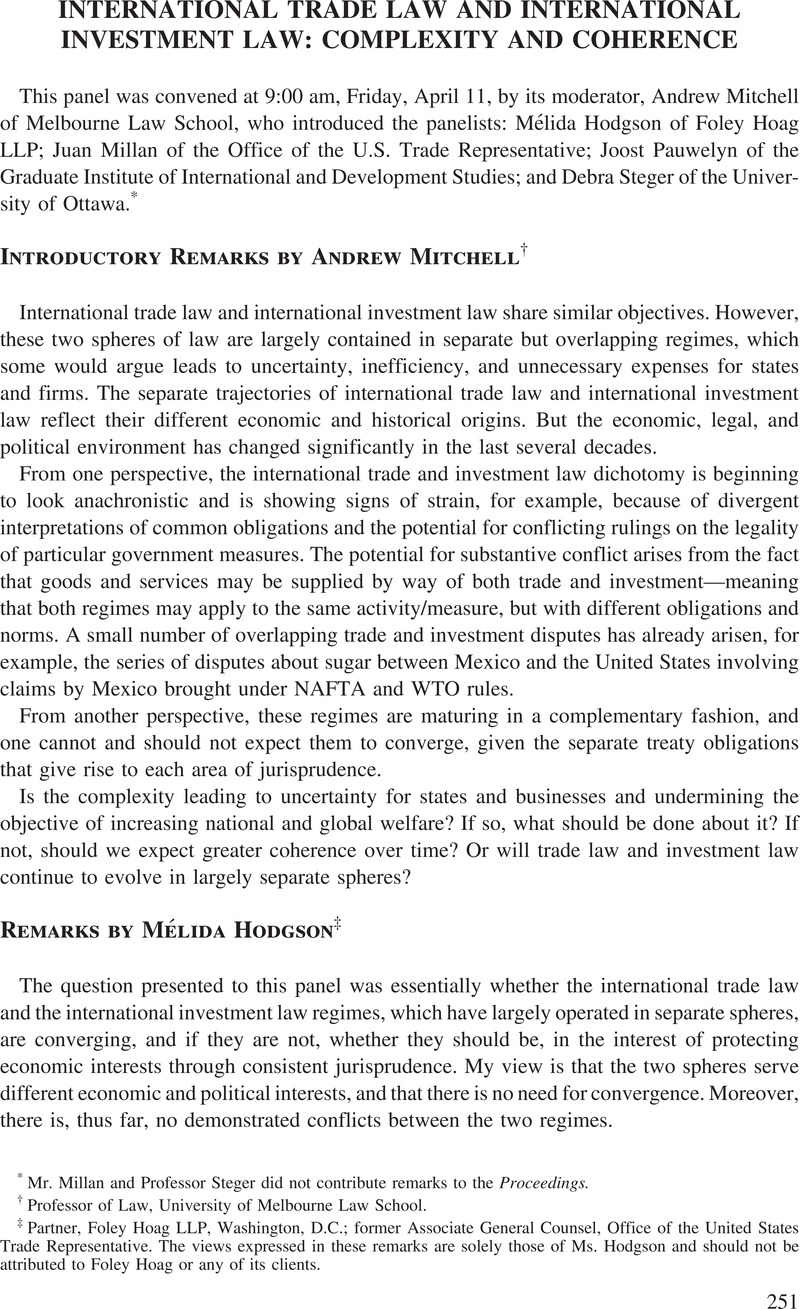Article contents
Remarks by Mélida Hodgson
Published online by Cambridge University Press: 20 January 2017
Abstract

- Type
- International Trade Law and International Investment Law: Complexity and Coherence
- Information
- Copyright
- Copyright © American Society of International Law 2015
References
1 See Australia—Certain Measures Concerning Trademarks, Geographical Indications and Other Plain Packaging Requirements Applicable to Tobacco Products and Packaging, WT/DS 434/1 (July 23, 2012) and WT/DS 435 (Apr. 10, 2012).
2 For example, my fellow panelist Professor Joost Pauwelyn has written several articles on this issue. See also Lee, Jaemin, Complementing Each Other or Stoking Further Complexity? Interaction Between International Investment Law and International Trade Law, 47 J. World Trade 421 (2013)Google Scholar.
3 See, e.g., Continental Casualty Co. v. Argentina, ICSID Case No. ARB/03/04 (Sept. 5, 2008) (security exception); Occidental Exploration & Production Co. v. Republic of Ecuador, LCIA Case No. UN 3467 Award (London Ct. Int’l Arb. 2004) (national treatment); Methanex Corp v. United States, Final Award (Aug. 7, 2002) (like products).
4 The WTO dispute settlement system is further strengthened by a Secretariat that closely assists panelists (some would say too closely) in hearing trade disputes (providing coherence) and by the ability of the Director-General of the WTO to appoint panelists upon recommendation of the Secretariat.
5 The selection of Appellate Body members has always been a trading game in and of itself, and is clearly very political, but its members are respected experts in international economic and trade law.
6 Setting aside the fact that the EU Commission now indisputably has competence over investment protection negotiations, even in its 1990s incarnation its views on these commitments were a factor that its states and their trading/economic partners had to take into account, and even then acceding countries had to “renegotiate” bilateral investment treaties that the EU Commission viewed unfavorably.
7 I say “effectively” because while other chapters of NAFTA, such as Chapter 19 (antidumping) may allow entities affected by antidumping measures to seek recourse before bi-national panels, the economic remedy available under that chapter (change in duties assessed) is constrained by each party’s domestic antidumping regulations.
8 Others include the Tembec and Canfor consolidated lumber cases (at the time, a separate dispute settlement process to deal with lumber disputes had expired).
9 See Mexico—Anti-Dumping Investigation of High Fructose Corn Syrup (HFCS) from the United States, WT/DS132/AB/RW (Nov. 21, 2001); Mexico—Tax Measures on Soft Drinks and Other Beverages, WT/DS308/AB/R (Mar. 24, 2006); Archer Daniels Midland v. Mexico, ICSID ARB(AF) 04/05 (Sept. 26, 2007); Corn Products Int’l, Inc. v. Mexico, ICSID ARB(AF)/04/01 (Jan. 25, 2008); and Cargill, Inc. v. Mexico, ICSID ARB(AF)/05/02 (Aug. 13, 2009).
10 Indeed, this would be difficult given the different provisions found under the more than 3,000 agreements providing investor-state protections, not least because of the general lack of transparency regarding parties’ arguments and tribunals’ reasoning in awards, compared to the full transparency called for in WTO proceedings.
11 See, e.g., U.S.—Import Prohibitions of Certain Shrimp and Shrimp Products, WT/DS58 (AB) (Oct. 12, 1998); U.S.—Measures Affecting the Cross-Border Supply of Gambling and Betting Services, WT/DS285 (Apr. 7, 2005).
12 It is important to remember that WTO trade remedies among states are prospective (although they have direct economic effect on investors), while awards in the investor-state regime are retrospective.
- 1
- Cited by


